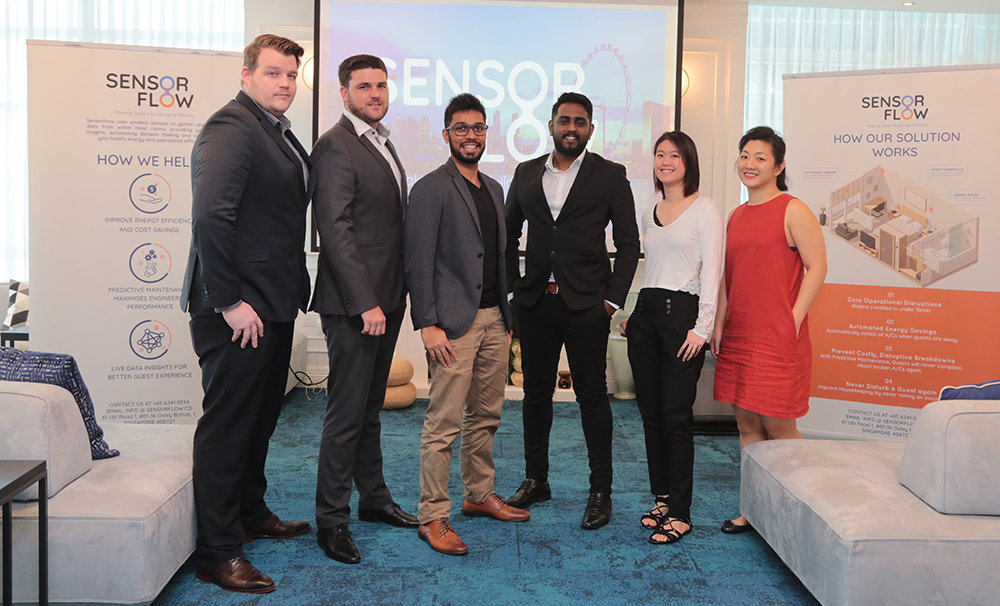SensorFlow provides smart energy management for hotels in Malaysia
By Tan Jee Yee June 14, 2019
- Aims to hit at least 800,000 rooms in the region by 2022
- Sensors can be installed in a manner of minutes
MANAGING energy consumption within a building can be a hassle. It’s not too bad at home – turning off the lights and using the air conditioning only when necessary are habits that can be conditioned. But how do you do so in an establishment like a hotel, where there are hundreds of rooms to handle?
IoT (Internet of Things) can help, and this is exactly what SensorFlow provides. The Singapore-based startup, which provides smart IoT solutions for hotel room environment management, has now officially launched in Malaysia.
Founded in 2016, SensorFlow’s solution allows hotels to monitor, analyse and automate hotel room environments (basically, the air-conditioning) in order to optimise energy efficiency and reduce operational costs.
The company has been operating in other markets outside of Singapore, including Hong Kong and Thailand, and has now decided to expand its services to Malaysia.
This expansion follows their recent US$2.7 million (RM10.98 million) Series A funding from private investor Pierre Lorinet in Febuary 2019.
“Global energy demand is increasing year-on-year and buildings alone account for almost half of global energy and carbon emissions. In particular, the tourism and hospitality sector accounts for 10% of global emissions, which has alarming impacts on global warming. However, at SensorFlow we believe that protecting the planet should not cost the Earth,” says SensorFlow CEO and co-founder Saikrishnan Ranganathan, also known as Sai.
“With our smart automation solution, we see this as an opportunity to partner with hotels in Malaysia by providing an affordable, non-disruptive solution that allows hoteliers to better manage and conserve energy for significant cost savings.”
Sensor at work
What SensorFlow does, is provide a set of sensors that can be installed in a room, which helps automate empty guestrooms and thus reduce unnecessary wastage. The sensors can tell when the guest has left the room and will either increase the air-conditioning temperature or turn it off to save energy.
The IoT tech at work here can also help monitor hotel room environments in real-time, including temperature, humidity, occupancy status and energy consumption. The data collected is accessible to hoteliers on a web-based analytics dashboard, which also allows the remote control and management of all rooms.
Sai says that by providing constant data monitoring of the hotel’s heat, ventilation and air-conditioning system (HVAC, for those in the industry), hoteliers can move beyond reactive – and preventive – measures to predictive maintenance strategies.
For instance, hotels can more easily block off and investigate rooms that have poorly performing equipment, and readily deploy hotel engineers and repairmen without intruding upon the guest’s time.
Because the sensor can detect room occupancy, SensorFlow can also help hotels optimise housekeeping routes for little to no guest disturbance.
Sai claims that with SensorFlow, hotels can save up to 30% in energy consumption, and up to 40% savings on maintenance costs. The sensors, he adds, can be installed in under 10 minutes for each room, with battery lives that can last up to five years.
Sustainability in mind
Sai says that hotels primarily face three challenges that keep them from implementing energy management solutions: large upfront costs, time and cost of installation, and vertical integration – problems that SensorFlow solves by providing sensors that are easy to install and manage, as well as using a zero upfront cost, profit-sharing model.
It doesn’t matter if the hotels are running older HVAC systems – SensorFlow can easily integrate them.
SensorFlow seems to have come in an opportune time. Travellers are reportedly seeking out more eco-friendly hotels to stay in, with surveys by Agoda.com and TripAdvisor all finding that a majority of travellers prefer to stay in green hotels.
“Sustainable practice is an on-going process. The increasing demand and the growing number of green hotels speaks volumes about the huge impact of sustainable solutions - not only does it reduce our environmental footprint, green solutions can generate great cost-savings,” adds Sai.
“We also see a huge potential in Malaysia as more ‘green’ hotels are emerging. In fact, we are currently running trials with a few major hotel brands in Malaysia and they are impressed with the results of savings as high as 30% on energy costs.”
SensorFlow has signed on about 2,000 rooms across Vietnam, Thailand, Hong Kong and Singapore, with another 70,000 in its sales pipeline across Asia. Sai notes that they are looking to expand to other Asian countries soon, and even Europe and the United States in the next 12 months.
They have notably provided their systems to The Ascott Citadines in Singapore (completing it within two days) and have recently added the Alila Villas Uluwatu in Bali to their client list. By 2022, they aim to hit at least 800,000 rooms throughout the region.
Related Stories :



